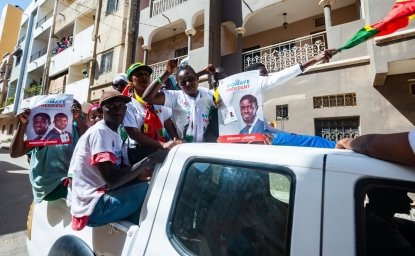The Iran-Saudi Arabia Conflict and its Impact on the Organization of Islamic Cooperation


The confrontation between the two bitter rivals Iran and Saudi Arabia has engulfed several Middle Eastern countries and many regional and international Islamic organizations, such as the League of Arab States, the Gulf Cooperation Council, and the Organization of Islamic Cooperation (OIC). This paper will focus on the impact of the Saudi-Iranian rivalry on the OIC.
Remarkably, the OIC—the largest international body after the UN, comprising 57 Muslim states—backed Saudi Arabia in its diplomatic spat with Iran in a harsh anti-Iranian resolution issued on January 21, 2016. The resolution accused Tehran of supporting terrorism and meddling in other countries’ affairs. The OIC had remained silent, however, on Riyadh’s execution of a prominent Shi’a cleric, Sheikh Nimr al-Nimr, which triggered a deepening rift between the two regional rivals.
The OIC has traditionally observed a strict policy of neutrality, preferring not to side openly with any of its member states when it came to disagreements among them. However, in August 2012, the late Saudi King Abdullah called an emergency Islamic summit to consider the issue of Syria’s suspension from the OIC, one of the most politically divisive issues for member states at the time. Because of its controversial nature, the General Secretariat shrouded the summit’s agenda in the euphemistic topic of “Promotion of Islamic Solidarity.”
This time, however, the OIC’s approach was uncharacteristically different and instead of acting in the spirit of “Islamic solidarity,” it convened a “punitive” emergency meeting of the Council of Foreign Ministers (CFM) on January 21, 2016 with the sole goal of flaying one of its own member states.
Initially, the OIC seemed willing to resolve the standoff between Saudi Arabia and Iran by means of diplomacy. Tareq Bakheit, the OIC’s director of political affairs, exuded optimism just nine days before the OIC emergency meeting and said the organization would be prepared to play the role of mediator. He pointed out the OIC could not intervene in the internal affairs of member countries or side with one country against another.[1] OIC Secretary General Iyad Madani was equally poised to seek a diplomatic solution and assist in mending the worsening relations between Saudi Arabia and Iran.[2]
However, the outcome of the OIC meeting was entirely different, having added fuel to the Iran–Saudi Arabia fire of mutual hatred. What caused a sudden reversal in the organization’s position on Iran? And how will this affect the OIC’s standing in the Muslim world? These questions highlight the need to review recent changes in the alignment of forces within the OIC.
Saudi Arabia Tightens its Grip Over the OIC
With the notable exception of Saudi Arabia, the Arab Spring gave rise to violent conflicts and protracted civil wars in many Arab OIC member states: Bahrain, Egypt, Iraq, Syria, Libya, Yemen, and Tunisia. Under these conditions, the 2013 Cairo Islamic summit meeting elected Madani, a Saudi national and former minister of culture and information, secretary general of the OIC. At that time, the election was in no small measure a tribute to Saudi Arabia’s political stability, economic prosperity, and solid international standing.
During my first meetings with him, Madani would often lament the lack of motivation for political cohesion on the part of OIC member states, underscoring their simultaneous membership in other international organizations, including NATO, the Arab League, the GCC, and ASEAN. These memberships accordingly interfere with the member states’ loyalties to the OIC. Unlike a potentially divisive political agenda, Madani considered the common Islamic values as the most viable foundation to unite the OIC.
Against all odds, in the first two years of his tenure Madani exerted much effort, primarily in partnership with Middle Eastern member states, to construct regional zones of “common religious and cultural space” to withstand challenges within the Islamic world. However, these efforts brought no tangible results. Presumably realizing the futility of building broad Islamic alliances within the OIC, Madani gradually began to draw on narrow and politically closer unions, like the GCC and the Arab League, which put its member states—and especially Saudi Arabia—at the OIC’s center stage.
The OIC as a Hostage of Political Circumstance
Saudi Arabia often invokes the “Muslim ummah fraternity” mantra for public consumption; however, it is the crude geo-political calculations rather than religious concerns that have recently shaped broader contours of its foreign policy. In the face of a rising feud between Tehran and Riyadh, the Saudis have exerted much pressure on the OIC with the goal of exploiting it fully for their political purposes. Why? Primarily because of the nuclear deal reached by world powers with Iran, which resulted in relative satisfaction on Tehran’s part and total dissatisfaction on Riyadh’s part. Therefore, changing the atmosphere of its strategic competition with Iran has become a priority for Saudi Arabia no matter what, even at the expense of dividing the Muslim world. In pursuing its goal, Riyadh resorted to scare tactics against member states, mainly using its financial lever to ensure support for its stance against Tehran. For example, Somalia, and several other Arab states such as neighboring Bahrain and Sudan (long-time close allies and recipients of Saudi largesse), received a pledge of financial aid from Saudi Arabia on the same day they cut ties with Iran. At the same time, Riyadh cut its financial aid to dissenting Lebanon, which refused to back the Saudi-initiated, anti-Iranian resolution.[3]
In the long run, what Riyadh achieved was quite the opposite. It hardly isolated Tehran but rather deepened inter-sectarian rifts within the OIC, which, unlike the Arab League, represents the entirety of the Muslim world. As a result, Shi’a Muslims now question the OIC’s independence and commitment to Muslim solidarity as the charter prescribes.[4] In fact, for them, this represents a credibility gap between OIC’s professed ideals and its actual practices.
The Saudi–Iran spat clearly demonstrates that internecine struggles between fellow Muslims—the clashes within a civilization and not between civilizations—are the dominant type of conflicts in the Middle East.
Quo Vadis the OIC?
The recent OIC summit in Istanbul, which was held in April this year, did not take any real steps to promote mutual understanding and trust between Sunnis and Shi’as. These developments do not bode well for the Islamic world; there is little chance of a united Muslim stance developing against the real challenges—like the Islamic State—in the foreseeable future. The lack of cohesion will further nourish a jihadist ideology, which is a growing global threat.
The Saudi–Iran spat clearly demonstrates that internecine struggles between fellow Muslims—the clashes within a civilization and not between civilizations—are the dominant type of conflicts in the Middle East. And behind it is a centuries-old conflict in Islam between Shi’as and Sunnis that has grown more acute recently, drawing in all Muslim countries and organizations. As acts of violence are increasingly being committed by and against Muslims, the need for the OIC, despite its many weaknesses, has never been so apparent. The OIC is the only political platform that can bring all Muslim leaders together for dialogue. For example, with the exception of Egypt’s President Abdel-Fattah al-Sisi, the Istanbul summit was attended by the leaders of all of the major Islamic countries, including Saudi Arabia’s King Mohammad bin Salman and Iran's President Hassan Rouhani.
This is why Russia, which enjoys observer status in the OIC, believes the international community should make every effort to promote the OIC’s visibility and to strengthen its role in regional and world politics. However, the question is whether the OIC is able to establish a genuine collective dialogue among its member states, transcending sectarian divisions or not. If not, then perhaps it would be more appropriate to speak of an “Organization of Sunni Islamic Cooperation” in the making.
The opinions expressed herein are those of the author and do not reflect those of the Wilson Center.
[1] http://www.arabnews.com/saudi-arabia/news/864761
[2] http://tribune.com.pk/story/1031861/oic-chief-seeks-healing-of-saudi-iran-rift/
[3] http://www.cnsnews.com/news/article/patrick-goodenough/saudis-cut-military-aid-lebanon-over-iranhezbollah-support-us
[4] Article 19 of the OIC Charter stipulates, “In the performance of their duties, the Secretary-General, Assistant Secretaries General, and the staff of the General Secretariat shall not seek or accept instructions from any government or authority other than the Organization. They shall refrain from taking any action that may be detrimental to their position as international officials responsible only to the Organization. Member States shall respect this exclusively international character, and shall not seek to influence them in any way in the discharge of their duties.”
Author
Professor of international relations; former regional exchange scholar, Kennan Institute, Wilson Center; and Deputy Permanent Representative of the Russian Federation to the Organization of Islamic Cooperation

Middle East Program
The Wilson Center’s Middle East Program serves as a crucial resource for the policymaking community and beyond, providing analyses and research that helps inform US foreign policymaking, stimulates public debate, and expands knowledge about issues in the wider Middle East and North Africa (MENA) region. Read more

Explore More
Browse Insights & Analysis
Africa Year In Review 2024: From Headlines to Trendlines


